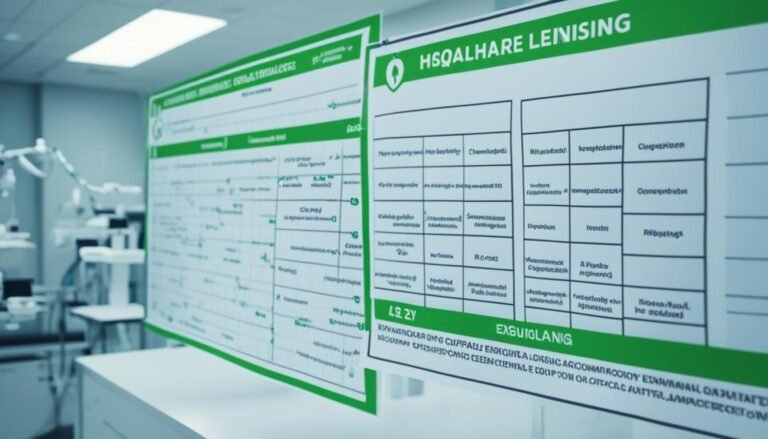The Role of the Mental Health Commission in Regulating Irish Healthcare
In Ireland, we’ve seen a big drop in the number of involuntary mental health admissions. From 2005 to 2013, the cases went down from 2,830 to 2,132. This shows how important the MHC is. It works to make sure mental health services in Ireland meet high standards and are fair for everyone to use.
The MHC started its work in April 2001 because mental health regulations in Ireland were complex. Since then, they’ve been striving for better mental health services with a National Quality Framework. This helps improve mental health care for everyone across the country. People like Dr. John Hillery and Chief Executive John Farrelly lead the charge to make sure everyone in Ireland can get the support they need.
Key Takeaways
- The MHC has played a critical role in reducing involuntary admissions in Irish mental health services.
- The MHC’s initiatives include mental health tribunals and maintaining a register of approved centers to ensure high healthcare standards.
- Legislation reforms in the 2001 Mental Health Act have introduced new procedures and protections for involuntarily detained individuals.
- The MHC’s regulatory scope covers inpatient services for children and adults, comprising approximately 1% of mental health services in Ireland.
- Children with intellectual disabilities frequently experience higher mental health issues, making MHC’s role indispensable in regulating Irish healthcare.
- The General Scheme aims to expand the regulation of mental health services to the community, reflecting the MHC’s growing impact.
- Collaboration between MHC and HIQA ensures the enhancement of health and social care services across Ireland.
Introduction to the Mental Health Commission
Established in 2002, the Mental Health Commission is crucial for overseeing mental health services in Ireland. It is an independent regulator with the goal of improving the quality of mental health care nationwide. This is under the Mental Health Act 2001.
Located in Dublin, it watches over various mental health facilities. These include services for adults, children, and adolescents, as well as forensic services and those for people with intellectual disabilities. It covers both public and private facilities. The commission ensures all in-patient mental health centers meet strict mental health regulations.
Inspecting these facilities yearly is a key part of its work. Inspectors combine document reviews, on-site observations, and interviews. They check if centers meet the standards set in the Judgement Support Framework. Each inspection leads to a detailed report. These include compliance and risk ratings. If a facility doesn’t meet the required standards, they must work on a plan to improve.
The Mental Health Commission values being open and accountable in Irish healthcare. It publishes inspection reports and helps with the Mental Health Tribunal system. This ensures the wellbeing and rights of those in care. It supports initiatives like the “Supporting Change” plan and the Decision Support Service (DSS). These aim for better, person-centered mental health care. In 2023, a new Act will increase its scope to include services for children and adolescents.
The Commission has actively supported giving voting rights to people living in long-term care. This shows their dedication to equal rights and better access to mental health care. They also focus on good governance and doing their part for the environment with the “Climate Action Roadmap.” The Mental Health Commission is a key player in advancing mental health care standards in Ireland.
History and Establishment of the Mental Health Commission
The Mental Health Commission in Ireland began its work with the Mental Health Act 2001. This act started working fully on November 1, 2006. It was a big step in the history of mental health care in Ireland. It aimed to set up a strong way to manage mental health services that followed the latest standards and respected human rights.
Formation and Legal Foundations
The Mental Health Commission was set up because Ireland needed new laws on mental health. Before the 2001 Act, the main law was the Mental Treatment Act from 1945. This law was old and needed updating. The 2001 Act brought in new rules and set up a special group to watch over mental health services. This group checks that people in care are treated well and their rights are respected, in line with European laws.
Initial Challenges and Achievements
At first, the commission had a lot of challenges to overcome. Making a new way to check mental health facilities was one big challenge. They also needed to change how services thought and acted to focus more on respecting people’s human rights.
Despite these difficulties, the commission has done a lot. They made important rules, started mental health checks done by independent experts, and made sure Irish mental health services followed the law through regular checks.
| Mental Health Act 2001 | Mental Health Act 1945 | |
|---|---|---|
| Implemented | 2006 | 1947 |
| Independent Tribunals | Yes | No |
| Human Rights Aligned | Yes | No |
| Involuntary Admission Review | Yes | No |
The Mental Health Commission, under the 2001 Act, has made Irish mental health care better. It ensures people get good service while protecting their rights.
The National Quality Framework: Driving Excellence in Mental Health Services
The Mental Health Commission (MHC) introduced the National Quality Framework. It is key for improving mental health services in Ireland. The goal is to use standards and criteria for a better approach that focuses on recovery and human rights.
Overview of the Framework
The Framework came after a lot of talks and research. The Royal College of Surgeons in Ireland (RCSI) helped out too. It covers care for a broad group, not just adults. This includes kids, teens, the elderly, and those with special needs.
This model pushes for better leadership and services that treat the whole person. It addresses the unique needs of every user and aims for care that helps people recover. It even has a toolkit for self-checks to keep things up to standard.
Implementation Strategies
Using the National Quality Framework means focusing on how things are run. The MHC wants service providers to really follow the Framework. This includes making sure every day gets better for the people they serve.
Data on Approved Centres looks at the places registered under the Mental Health Acts. It’s a must for good care in these places. The MHC also suggests using technology to always get better at care.
Impact on Mental Health Services
This Framework has changed mental health services a lot. It pushes them to use the best proven methods, work on getting better all the time, and listen to feedback. This makes sure everyone is treated fairly, with care that understands what they’ve been through.
It’s key in this framework to use the latest tech. HCI supports this with tools like the PPG Library™ and others. This tech makes sharing info and improving care easier.
There were many good points about the 2007 Quality Framework. People’s views and what experts said were clear. They said we must always think about showing respect and kindness in mental health care. So, the National Quality Framework works hard to meet these high standards and keep improving all mental health care in Ireland.
| Period | Feedback & Efficiency | Most Used Frameworks |
|---|---|---|
| 2021 | 85% | 2007 Quality Framework |
| 2022 | 90% | National Quality Framework 2023 |
| 2023 | 95% | National Quality Framework 2023 |
The Role of the Mental Health Commission in Regulating Irish Healthcare
The Mental Health Commission is crucial for overseeing *healthcare* in Ireland, with a focus on *mental health services*. It works in line with the country’s mental health strategy, “Sharing the Vision.” This approach puts people at the center of mental health care.
Just 1% of mental health services are regulated under the Mental Health Act 2001. This includes care for children and adults who stay at hospitals. In the upcoming fiscal year, Ireland plans to spend €1.3 billion on mental health. But, only €13 million is for new services. This shows the great need for proper regulation and a focus on mental health.
A recent report found that out of 20,000 people, 576 in CAMHS didn’t meet their care teams for six months. This information shows there are big gaps in service. It’s clear we need to work hard to fix these problems.
The Mental Health Commission works with other groups to regulate healthcare:
- The Nursing and Midwifery Board of Ireland looks after nurses and midwives.
- The Dental Council checks on dentists, oral surgeons, and orthodontists.
- The Medical Council watches over medical doctors.
- The Pharmaceutical Society of Ireland takes care of pharmacists.
- The Pre-Hospital Emergency Care Council manages care providers outside of hospitals.
- CORU looks after healthcare professionals like counselors, psychotherapists, and dieticians.
In 2017, 75% of Ireland’s mental health units didn’t meet building regulations. This number was 67% in 2018 and 69% in 2019. One third of these units had cleanliness problems. But, things are getting better. For example, in 2019, only 20 out of 65 services met all standards. By 2020, this moved up to 36 services.
In the last five years, new mental health units have been built to high standards. They include single bedrooms with a bathroom and good indoor and outdoor space. This shows that focusing on healthcare regulation can lead to better services.
People like the government, service users, doctors, and care providers are working together. Their goal is to raise standards and make sure everyone gets the best care. This effort aims to improve the quality and safety of mental health services.
Making mental health services better needs strong rules and a promise to do our best.
Oversight and Regulatory Functions
The Mental Health Commission plays a crucial role in improving Ireland’s healthcare system. It checks on mental health service inspection and licenses mental health buildings. It also makes sure health care services follow the rules. Thanks to these efforts, the quality of mental health care is kept high.
Inspection and Licensing
The Commission inspects mental health services. It looks at different sites to check if they meet safety and care standards. Before places are allowed to treat people, they must prove they are up to scratch. This helps ensure only good-quality services are available to the public.
Compliance and Enforcement
Ensuring rules are followed is a top priority for the Commission. It makes sure mental health facilities run legally and ethically. A special service, known as the Decision Support Service, was added to improve this work. With more funding every year, the Commission strengthens its ability to support mental health for young people and in the community.
The Commission’s work is vital for keeping Ireland’s mental health care top-notch. It shows the country is serious about health care rules.
Strategic Plans and Future Goals
The Mental Health Commission (MHC) in Ireland is over 20 years old. It started under the Mental Health Act 2001. Since then, the MHC has grown a lot to meet the mental health service needs. For example, the staff increased from 50 in 2018 to 132 now.
The MHC has a new plan for 2023-2027 called “Supporting Change.” This plan is a big step forward. It focuses on starting the Decision Support Service (DSS). The DSS will help people with various needs, such as intellectual disabilities and mental health issues.
The MHC also plans to support those with diminished decision-making ability. This is important for people with age-related conditions or acquired brain injuries.
2023-2027 Strategic Plan
The 2023-2027 Strategic Plan sets out big goals for the MHC. Some highlights include promoting assisted decision-making and improving care quality in approved places. The MHC also aims to act in the public’s best interest and involve users of mental health services.
A key part is a new quality framework. It will improve services by setting clear standards and encouraging betterment.
Integration with National Policies
The MHC is aligning its work with national actions for better mental health care. It’s extending its oversight to include all community mental health homes. This involves getting ready for upcoming mental health laws. With a budget of nearly €73 million, the MHC plans to make services better over five years.
Focus is also on making sure the organization runs well. This means having the best rules and keeping people accountable. The MHC and the Department of Health are working together. They aim to make care smooth and fair for everyone who needs it. This work is part of the plan to offer fast and fair healthcare access across Ireland.
| Year | Key Highlights |
|---|---|
| 2023 | Operationalize DSS; Promote assisted decision-making |
| 2024 | Expand regulatory scope; Enhance quality standards |
| 2025 | Enhance community care integration; Align with new mental health bills |
| 2026 | Focus on governance; Monitor service improvements |
| 2027 | Evaluate and refine strategies; Ensure sustainable progress |
Conclusion
The Mental Health Commission of Ireland is a key player in improving healthcare in Ireland. It has been pushing for better mental health services since its start. This includes making sure that care meets high standards. It has made progress in treatment and keeps patients safe.
The Commission focuses on people, as seen in the National Quality Framework and its 2023-2027 Strategic Plan. Its plans and actions have improved mental health services. It really stands up for mental health in the country.
The Commission also worked to make the process of being admitted to a mental health facility easier. But it also made sure patient rights were still respected. The Commission faces some tough issues, like needing better laws and more outpatient care. However, they are leading important changes. They want to keep mental health services a top priority in Ireland. This work is making a big, positive difference in how mental healthcare is delivered.
Source Links
- Mental health law profile on the Republic of Ireland
- Microsoft Word – Opening Statement MHC 25.06.22
- Overview of Mental Health Services
- Mental Health Commission annual report 2023: including the report of the Inspector of Mental Health Services and the report of the Director of the Decision Support Service.
- Mental Health Legislation
- Mental Health Legislation in Ireland: A Lot Done, More To Do
- Microsoft Word – RCSI Consultation Report for MHC November 2022
- The National Quality Framework: Driving Excellence in Mental Health Services
- Summary of the new National Quality Framework: Driving Excellence in Mental Health Services – HCI
- Lack of regulation in mental health sector ‘wouldn’t happen in any other walk of life’
- Q&A: Regulation of healthcare services in Ireland
- Report by Mental Health Commission finds many facilities to be unsuitable after years of neglect
- Mental Health Services
- Joint Committee on the Future of Mental Health Care – Final Report
- Building on the vision of a better mental health service –
- Department of Health OGP Annual Report 2022








